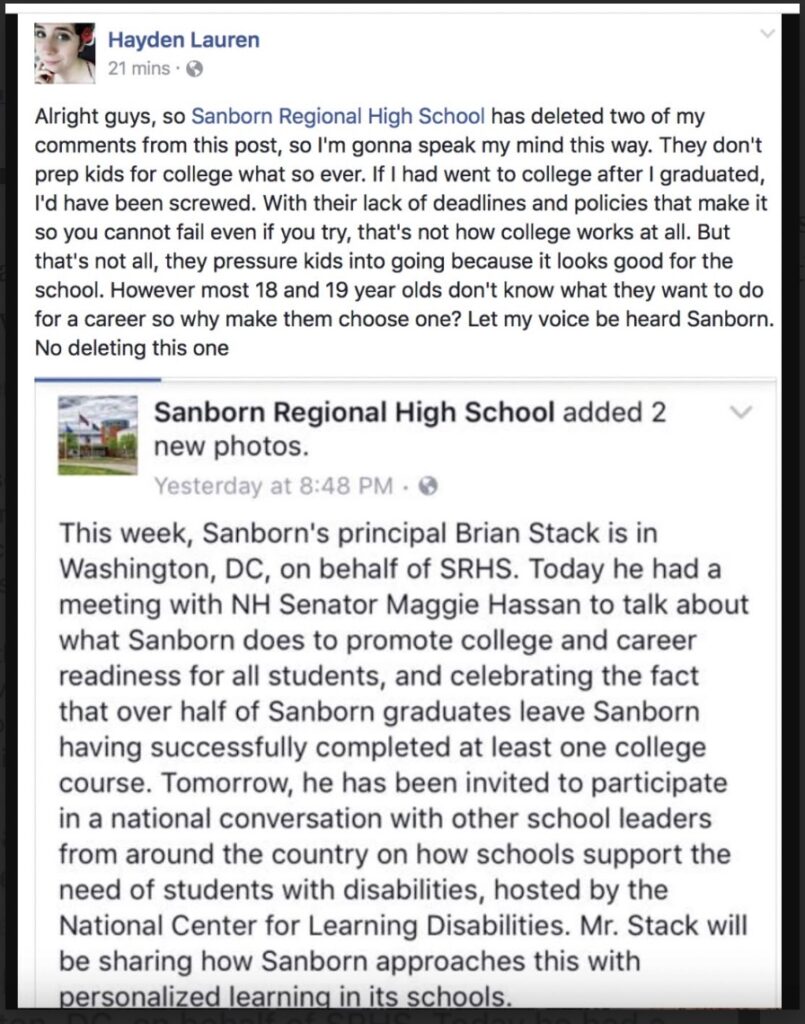I connected the dots on The Learning Initiative here: Snake Oil Coming from New Hampshire’s Learning Initiative. As you can see, this organization is focused on pushing failed fads on our public schools. If Competency-Based Education was so successful, why are private and parochial schools so reluctant to adopt it? Perhaps because they recognize that K-12 education is the primary opportunity to educate children. Directing focus away from learning the academic content to focusing on non-academic soft skills is NOT a way to increase literacy in the core subjects.
Recently, the New Hampshire Department of Education advertised a conference for teachers this summer through The Learning Initiative. As I scanned through this conference, the typical failed fads in public education jumped out. For instance, in this article from Joanne Jacobs, she explains the real problem with the “inquiry-based” learning fad that has plagued public schools for decades. Leaving students to discover knowledge is a recipe for failure:
“Decades of converging evidence” supports the effectiveness of direct instruction, especially for novice learners who need to build foundational knowledge, he writes. Cognitive-load theory has more than 30 years of “robust research behind it.”
Cognitive science research has found that knowledge, stored in long-term memory, enables learning, Hendrick writes. “One cannot think critically about what one does not know.” Or to put it another way, “You cannot connect the dots if you don’t have any dots.”
“Teacher autonomy” shouldn’t mean letting teachers ignore the evidence about what works in favor of “vibes, ideology and whatever ‘feels right,'” he writes. “Professionals in other high-stakes domains such as medicine, aviation, engineering, routinely follow evidence-based protocols, not because they are automatons, but because they are accountable to what works.”
Explicit instruction works well for children with learning difficulties, he adds.
We are aware of all this, yet these fads are still promoted to teachers when they are pursuing a teaching degree, through direct grants to schools, or through other channels.

This is why I decided to reach out to the NH Department of Education. If they are going to include these conferences, they should be aware of the problems that come with these fads in public education. Inquiry learning is a great way to force parents to pay for tutors, so why continue to push these fads on teachers?
Here is the email I sent to the New Hampshire current and incoming Commissioner:
Hello,
I am hoping someone will be able to offer some clarity on some of the sessions offered by the New Hampshire Learning Initiative. A link to a conference was included in the Friday Forum this week.
The NH Learning Initiative is offering a Competency-Based Learning Summer Conference July 14-15 featuring two full-day math sessions: Advancing the Thinking Classroom – Elevating Critical Thinking, Collaboration, and Problem-Solving in 6-12 Mathematics and Reimagining the Math Classroom – Elevating Deep Mathematical Thinking, Engagement and Collaboration in K-5 Mathematics. Register now; there is a special registration rate for new teachers within their first five years, and participants in NH PLACE attend at no cost.
I remain a critic of Competency Based Education, and The Learning Initiative in New Hampshire. I hope at some point, we will get independent and peer reviewed studies showing how CBE has impacted learning outcomes.
Everyone should be reviewing the competencies in the core subjects in our public schools. Many times the competencies listed do not equal mastery of the core subject content that should be mastered. CBE gives the illusion that if a student passes their competencies, they’ve mastered the core academic content. I wrote about that in The Patch back in 2013 after I asked Prof. W. Stephen Wilson from Johns Hopkins to review Algebra 1 Competencies at some of our local public schools,: https://patch.com/new-hampshire/bedford-nh/bp–redesigning-new-hampshire-schools-through-outcomeccd4fa1937
As I scanned through what would be offered by the Learning Initiative, there were some sessions that warrant further explanation. I’m hoping someone at the Department can offer some insight, since this is directed at educators in New Hampshire.
1) Page 7: Building Essential Skills Today (Best) for the Future: Integrating the Portrait of a Graduate into Classroom Practice.
*** What is meant by: “maintaining a focus on equity?” What is the purpose of this national agenda in NH schools?Panorama was founded by former US AG Merrick Garland’s son-in-law, and was criticized for going after parents who were vocally critical of Critical Race Theory in their local public schools. Panorama Education’s website shows how they build their behavioral surveys and data collection around Portrait of a Graduate.
Portrait of a Graduate programs are aligned with a national agenda, and not a local initiative. Its vision and purpose are aligned with globalist agendas to bring about social change agendas like SEL, DEI, and Social Justice activism. This is used to track a student’s knowledge, attitudes, and dispositions with no real privacy protections.
2) Page 7: From Vision to Reality: Transform Learning with PBL in a Competency Based Classroom
***Why is PBL promoted as a teaching method when explicit and direct instruction in some of the core classes will produce better academic outcomes? Especially in the field of Mathematics? This would be detrimental to subjects like mathematics:
https://www.nifdi.org/what-is-di/project-follow-through.html?fbclid=IwY2xjawHS739leHRuA2FlbQIxMAABHbcSQrF1u5dv9Pa7pf-wbLAOC9UQvf08CsK2cY-Cy_fFGNIOAhfh4ya29Q_aem_Qiw_B8ogouz6G-Iu8w6Jvw3) Page 8: Fostering Student Agency for Positive Change
***This appears to be pushing political activism on students. Is this the purpose of public education?4) Page 9: Reimagining the Math Classroom: Elevating Deep Mathematical Thinking, Engagement and Collaboration is K-5 Mathematics
***Once again, there is a reference to the NCTM who has been highly criticized by top mathematicians in the past for “distorting the teaching processand heavily impair the learning of school mathematics.” http://www.mathematicallycorrect.com/frankallen.htm What has changed? How does collaboration improve math literacy?
Response to NCTM and CEC Position Statement:
https://aletheia-society.org/wp-content/uploads/2024/12/Response-to-NCTM-and-CEC-Position-Statement-12-19-2024.pdf?fbclid=IwY2xjawH6F9tleHRuA2FlbQIxMAABHXn_u8SAt5ENk5Phb_Wwv1b_DeobysxjmeGe_61ybP0kzNzHwbvHq50tJQ_aem_HU7Ud7ljsjaYILOiR_rX8A5) Page 9: Grading and Learning for Equity
***What does this mean? What are equitable grading practices? This is presented by Brian Stack.
Brian Stack was heavily criticized by former graduates. I worked with those students, and their parents who wrote scathing reviews of Stack’s tenure at Sanborn. Here is one of many:
This was from 2015-2016 where 28% of the 11th grade students scored proficient in math at Sanborn Regional High School. Is that what we now consider successful?
6) Page 10: Igniting Curiosity: Designing Inquiry Based Learning in Social Studies
***Who should be determining the pedagogy used in the classroom? Where are independent and peer reviewed studies showing inquiry based learning improved academic outcomes over teacher-led explicit instruction?The Learning Initiative used a questionable study from the Barr Foundation/ U.S. Department of Education to further its CBE agenda. They are big supporters of Competency-Based Education, and are listed here with Nellie Mae Foundation. They do not prioritize academic excellence, but instead you can see how Nellie Mae prioritizes creating community organizers.
It would be helpful if someone from the NH DoE was scrutinizing these conferences, seminars, etc. to make sure that what is being offered to teachers supports excellence in the classroom. Based on what I’m looking at, I do not see that.
Sincerely,
Ann Marie Banfield
Parental Rights Advocate Focused on Excellence in Education


